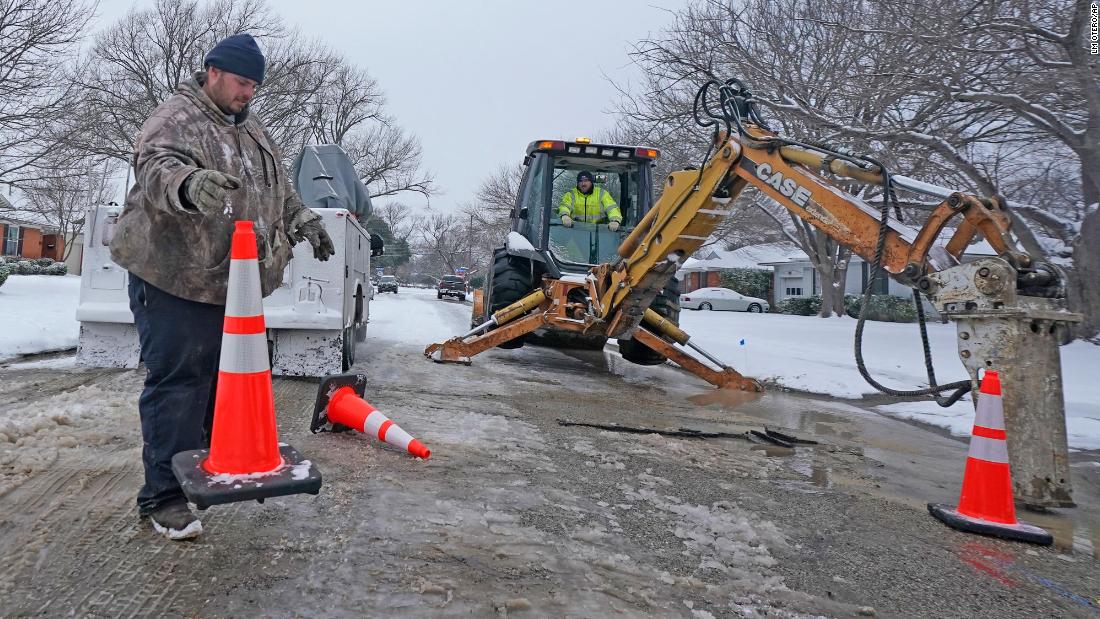
Whether it’s too much or too little water, high pressure or low pressure, or just the wrong shape, water has been a major problem for Texans during this ongoing catastrophe.
About 590 local water systems in 141 counties reported disruptions to their service, affecting about 11.8 million residents, state officials said.
Here’s a look at how problems with water have exacerbated an already difficult crisis for millions.
Fire departments, hospitals and airports are all struggling
With cracked pipes, no working generators and even frozen hydrants, water pressure has taken a hit across the state.
For firefighters at the San Antonio Fire Department, the low water pressure from the cold means they have to do more with less.
“Our normal attack would involve multiple hoses and a lot of water on the fire, so of course we just had to adapt,” said spokesman Joseph Arrington.
Meanwhile, flights at Houston Hobby Airport have been canceled or diverted due to a lack of water.
Hospitals are also not safe from the problems. Harris County Judge Lina Hidalgo called low water pressure “a huge problem” for hospitals and asked the community to stop dripping faucets in an effort to keep water pressure high.
Some use melted snow and pool water for drinking and flushing toilets
The low water pressure has made basic needs such as using the bathroom difficult.
At McMurry University in Abilene, residents use melted snow and water from an on-campus pool to flush toilets, while members of the soccer team and other volunteers bring water to the residential halls.
But due to the lack of water, the campus also had to close a boiler to a residential hall, which supplies heat to those dormitories. As a result, the school opened a resident warming facility.
And they are not the only ones to get creative.
In Crestview, Smita Pande told CNN that she and others may need to use melted snow to drink when they run out of bottled water.
“ We didn’t expect the water to be cut off, but once that happened we assumed some kind of ‘worst case scenario’ and took snow from the balcony and put it in kettles and pots to use for drinking water for in case we don’t get water back soon, ”said Pande. “If the power outage is any indication of how long that will last, then we’ll be boiling snow for a while.”
Brenda Aly, of San Antonio, was in a similar situation, using a neighbor’s pool water and snow to fill and wash toilet tanks.
“Every now and then we sit in our cars in the driveway to heat and charge our phones,” she said. “Once we go through our bottled water, snow is our only drinking water option until our water returns or stores can open.”
When pipes freeze, the ceilings collapse
The problem doesn’t stop with hydration, however.
Sandra Erickson, who lives in Friendswood, just outside Houston, said it got so cold in the house she’s renting with her husband that the pipes burst – causing the ceiling to collapse in three rooms.
“We could hear water flowing between the walls,” Erickson said.
The power has just come on, she said Wednesday, but they had been without it since Monday. She also isn’t very confident that it will last.
“We’re in the house and have the fireplace for some warmth,” she said. “We have nowhere to go.”
And they are not the only ones. Harris County judge, Hidalgo, said more than a million homes have had no power and so are experiencing water problems due to some pipes bursting from the cold.
“So we see the secondary and further effects of the flow. For example, the pipes burst from freezing water,” she said. “Others have low pressure because the generators supporting the pressure are empty. So many of our cities … are reporting problems.”
About 7 million Texans are under cooking water advice
According to Texas Commission on Environmental Quality Commissioner Toby Baker, nearly 7 million Texans are currently affected by knowledge of boiling water – a particularly stark number as many may not have the power to boil water.
More than 260,000 people in the state have been affected by non-operational water systems, he said, a number that has risen dramatically in the past 24 hours.
In Waco, Mayor Dillon Meek is urging residents to slow their water use, after a false rumor said the water would be shut down permanently.
The city’s system takes time to recharge, Meek said, and if capacity at treatment plants were to drop again, the city would have to fall under boiling water.
Meanwhile, in Galveston, major water pipe ruptures and system outages have brought water supplies to extremely low levels.
Even if the water does return, the city will provide advice on boiling water, a statement said.
CNN’s Carma Hassan, Paul P. Murphy, Keith Allen, Andy Rose and Joe Sutton contributed to this report.